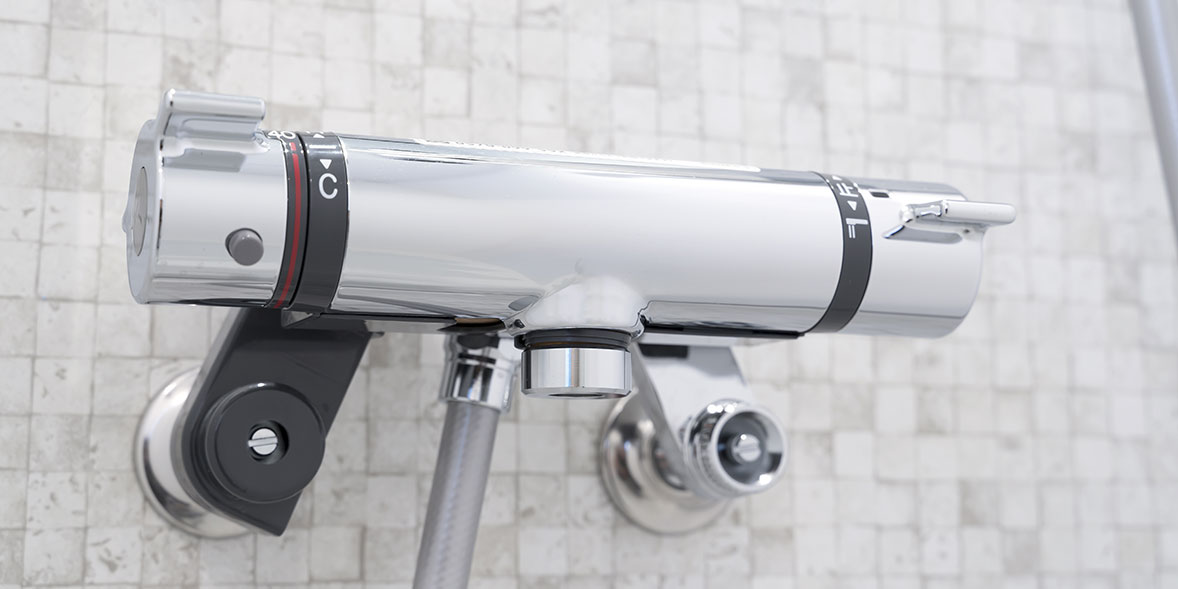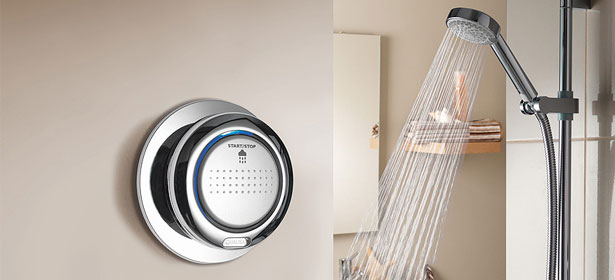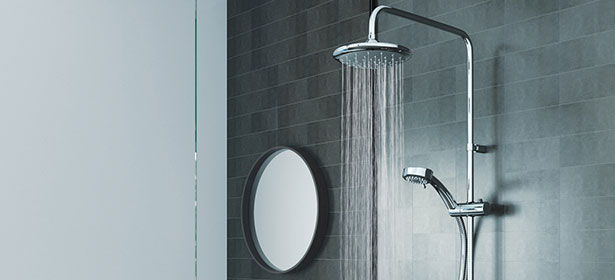Na veiwaki cava ni sovaraka ena cakacaka vinaka duadua ena nomu vale
When buying a new shower mixer, the first thing you need to consider is the type of water system you have in your house as this can affect the models you can choose.
Any water system will work with an electric shower, but shower mixer rely on readily available hot water supply, which means you’ll be more limited.
Here’s the key points to bear in mind:
- If there’s no hot water supply to that bathroom, you’ll need an electric shower mixer.
- If there’s hot water and you don’t have a gravity fed system, you should get a shower mixer .
- If there’s hot water and you have a gravity fed system with good water pressure, you should get a shower mixer .
- If there’s hot water and you have a gravity fed system with poor water pressure, you should get a power shower mixer.
High-pressure water systems
Both vented and unvented water systems deliver water at mains pressure and are well suited to mixer or digital showers. Here’s how to check which you have.
- If you have a combination (combi) boiler then you have a high-pressure vented water system. In this system your combi boiler, usually located in your kitchen, heats cold water from the cold mains supply as soon as you turn on the shower, removing the need for a storage tank.
- If you have a hot water tank but no cold water tank then you have a high-pressure unvented water system. Water is stored in the strengthened hot water tank, often situated in an airing cupboard, and is then heated by either immersion heaters or by a central heating boiler.
Low-pressure water system
If you have a cold water tank (normally in your loft) and a separate hot water tank (normally in your airing cupboard) then you have a low-pressure gravity system.
The water pressure in this system is generated by gravity and is dependent upon the distance the water drops from the cold water tank. So, if there’s little distance between your shower and your water tank then you’ll get low water pressure.
This system is usually best suited to power or electric showers, although if you have good-enough water pressure then you could use a shower mixer.
Cold mains supply
If you don’t have access to any hot water – as may be the case in an outbuilding – or if there’s only a limited amount, then you’ll rely on the cold mains supply.
Electric showers: what you need to know
When choosing an electric shower mixer you need to consider its kilowatt (kW) rating. These range from around 7kW to 10.8kW.
In general, the higher the rating, the more powerful your shower will be – although you may notice a drop in winter, when the colder water takes longer to heat up.
If you’re replacing an existing electric shower and want to upgrade to a more powerful unit then you need to consider the following:
- Is the water pressure in your home adequate? Shower manufacturer Triton recommends a minimum pressure of 1 bar for a 7kW shower, rising to 1.5 bar for a 10.5kW model.
- Can your electrics handle the amount of power? Triton recommends a 32A fuse or circuit breaker for a 7kW shower, rising to 45A for a 10.5kW model.
- Is the electric cable running to the shower big enough? Triton recommends a 6mm cable for a 7kW shower, increasing to 10mm for models above 8kW.
Who are electric showers suitable for?
Anyone can have an electric shower installed, as they use cold mains water and aren’t affected by the type of water system you have in your home.
Because they generate their own hot water they’re usually the shower of choice for households where hot water created by the boiler is in short supply.
But their use isn’t limited to this sort of setup. Even if you have a high-pressure system that delivers plenty of hot water, an electric shower could still be of interest, especially if you’re creating a new bathroom. That’s because it’s often much easier – and cheaper – to connect a new shower to the existing cold water supply rather than rerouting hot water pipes.
A small number of electric shower mixer even include their own pump to boost the water pressure. These are expensive but can offer a solution if you have a low flow rate in your home.
What are the drawbacks of an electric shower?
Although they can be used in high-pressure systems, you’ll usually get a higher flow rate from a mixer shower if you have this sort of setup at home. If you live in a hard water area then their heating elements can be affected by limescale (in the same way it can affect the element in your kettle).
The main body of the units aren’t usually particularly stylish, especially on cheaper models, while the need to incorporate a heating element means they’re bulkier than more discrete shower mixer.
Shower mixer: what you need to know
A shower mixer blends supplied hot and cold water to the desired temperature and delivers it through the shower head.
Concentric, dual and bar mixer controls enable you to leave the temperature at your preferred level when you’ve finished showering; single lever and rotary do not.
Shower mixer are available in a number of styles, but the most common are shown in the table below.
Single lever

As the name suggests, this has one lever you pull out to turn on and control the flow and turn to adjust the temperature. This can be built in or left exposed on your wall.
Rotary or sequential

A single wheel you turn to activate the shower and control the temperature (you can’t adjust the flow). Again, available as a built-in or exposed option.
Concentric

Comprises an outer wheel to turn on and control the flow and an inner one to adjust the temperature. Available as a built-in or exposed option.
Dual controls

This has separate control dials to control the temperature and the flow (the latter can sometimes divert some of the water to a second shower head or the bath tap). Usually only available built in.
Bar mixers

Consist of a bar, either vertical or horizontal, with dials at either end to control the temperature and flow (again, sometimes with divert options). Bar mixers have to be exposed.
Who are mixer showers suitable for?
Mixer showers typically work with any plumbing setup provided there is a hot water supply. Some are specifically designed for high or low-pressure water systems – make sure you check the model you’re interested in before buying.
Why choose a mixer shower?
Shower mixer are more modern in design and tend to offer more advanced functions than electric showers (including digital options).
They’re also more attractive, as there is no need for an unsightly plastic box containing the heating element and controls.
If you have a high-pressure system, they’ll typically give you a higher flow rate than an electric model.
What are the drawbacks of a shower mixer?
Shower mixer don’t have their own pump, so won’t increase the flow of water to the shower. This means if you have a weak water flow from your taps, the same will go for your shower.
If that sounds like your house, you’d probably be better off with a power shower.
They also rely on an external hot water supply, so if your boiler is slow to heat up, your shower will be too. And if your boiler breaks, you’ll be left without a hot shower.
If you’ve got an unreliable boiler then it may be worth investing in a new model. Read our guide to the best boiler brands to discover which you should choose.
Power shower mixer: what you need to know
Power shower mixer work in the same way as mixer showers in that they combine water from both the cold and hot water supplies.

Where they differ is that they contain a pump to boost the flow of water through the shower head. This makes them a popular option in homes with low-pressure systems.
There are two types of internal shower pumps, plastic and brass. Plastic pumps are cheaper but can be noisier and are unlikely to last as long.
Who are power shower mixr suitable for?
Power showers are ideal if you have a low-pressure gravity system. They should not be used with a high-pressure system (either vented or unvented).
Why choose a power shower mixer?
For one reason only – to boost the flow rate in your shower if you have low water pressure in your house. This can transform your showering experience, as you get to enjoy an invigorating blast of hot water rather than a meagre trickle.
What are the drawbacks of a power shower mixer?
Power shower mixer are more expensive than electric or mixer showers and use a lot more water. As well as being bad for the environment, if you have a water meter you’ll notice the impact on your water bill.
They also use more energy than other types of shower because they have to heat more water during the course of each shower. This means your energy bills will be higher, too.
Discover which power shower brand is built to last in our guide to the best power shower brands. Feedback from our latest customer survey found that an exceptional 90% of its showers were still fault-free after eight years use.
Digital showers: what you need to know
Digital showers are the latest innovation in shower design, offering features such as precise temperature settings and wireless control units that can be installed elsewhere in your bathroom.

They work in a similar way to mixer and power showers, taking water from your hot and cold water feeds. But whereas traditional showers require you to manually adjust the temperature, a digital shower lets you accurately set it using the wireless controls.
Who are digital showers suitable for?
As long as you have access to a hot water feed then you can install a digital shower – you can’t yet get a digital electric shower.
You will need to consider the water system you have in your house, as some digital showers are designed for low pressure/gravity systems (and often include a pump – effectively making them digital power showers) and others are designed for high-pressure systems (digital mixer showers).
Why choose a digital shower?
Digital showers look modern and offer novel features that, while not essential, can be handy.
Many models offer a range of presets so everyone in the house can save their favourite temperature and flow rates, all accurately displayed on an LED screen – there’s no need to reach in to see if it’s hot enough. Some even have remote controls, so you can turn them on before getting out of bed, while others include smart apps that let you track use.
And unlike with a normal mixer shower, you can locate the digital mixer unit (the part that combines the hot and cold water feeds) separately from the shower itself. This means you can hide it away, giving you a sleeker, minimal look in your bathroom and making it easier and less disruptive for your plumber to install.
What are the drawbacks of a digital shower?
Digital showers are more expensive than standard mixer or power showers. In our latest customer survey we found they were less reliable than more traditional units – the more advanced technology means there’s more that can go wrong.
What shower features are important?
While shower mixer are generally fairly simple devices, manufacturers are constantly revising them and adding new features – especially on more expensive models.

Key features to look out for
- Thermostatic protection – a thermostatic shower is designed to keep the temperature steady to within a couple of degrees, so they should prevent it from turning painfully hot and then numbingly cold if the mains water is used elsewhere in your home.
- Automatic shutdown – a safety feature that turns off the shower should either the hot or cold water supplies fail.
- Maximum temperature – another safety feature that prevents the shower being manually turned too hot (useful for families with fairly young children).
- Limescale protection – different manufacturers offer their own solutions to limescale. Typically it’s handled through a phased shutdown in which increasingly cool water is run through the shower once you’ve finished using it. Limescale is a particular problem for electric showers as they have their own heating element which can get furred up and is hard to access.
- Multiple heads / diverters – some showers combine a main large head with a small, manoeuvrable one that can be useful if you’ve got small children or pets to wash. A diverter valve allows you to switch the water flow from one head to the other depending on your need.
- Flow and spray options – even the most basic shower will typically let you choose from a limited number of power and spray settings. Spend more and you’ll get more choice, such as eco options that reduce the amount of water used and ‘boost’ features that aerate the water stream to increase the flow rate.
As well as these standard features, some specialist showers come with options that make them especially suitable for people who find showering difficult.
These showers – usually called care or inclusive showers – often offer users tactile controls that are easy to operate and which may even provide audio feedback (helpful for those with limited vision).
Some versions let you set the maximum and minimum water temperature and include smart functionality to monitor use – something that carers might find very useful.
 iVIGA Tap Factory Supplier
iVIGA Tap Factory Supplier

